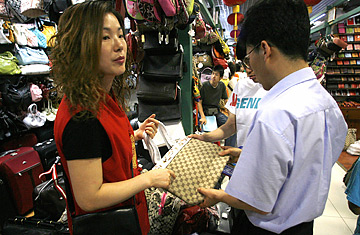
Customers look at a fake Gucci handbag in Beijing's famous Silk Alley market, June, 2006.
It's all very convincing, but almost all of the goods sold in these markets are knockoffs that bear no relation to the original. Your "Rolex" might keep ticking for a year or two, but then again it might stop after a few days. And those "Timberland" boots? Well, I needed a pair to get through Beijing's fearsome winter so I went down to the Silk Market, one of the emporiums of fakery. For $15, I picked up a pair of solid-looking work boots bearing a famous label. A few months later, I am still wearing the boots. Much to the amusement of my children, though, where once the pair were a uniform tan, one has now metamorphosed to a deep orange while the other is the color of milky coffee. When I went back to the Silk Market to complain, the person who sold me the boots was nowhere to be seen. How do you say caveat emptor in Chinese?
On my way out, walking past the hundreds of booths and brushing off the clutching hands and pleas to "come inside, mister, just looking," I noticed a series of very serious, official-looking documents pasted up prominently on the wall near the exit. Scanning them, I realized they were the proudly posted announcement of an earlier court judgment in which 23 prominent brand manufacturers sued the Silk Market for counterfeiting. On January 17 the Chaoyang district court in Beijing weighed in with the head-snapping pronouncement that there was not enough evidence of counterfeiting at the Silk Market to convict. As I stood there, a young lady from the stall nearest me pulled at my sleeve, trying to get me to come over and view a rack of t-shirts, many of them emblazoned with the names of the very companies that had sued: Versace, Louis Vuitton, Prada and Levi's.
Washington has spent over a decade trying to get Beijing to rein in pirates and counterfeiters and this may seem like just another episode in a long-running story. But it's not. Chinese papers feature a prominent story practically every other week in which a senior government official promises to take serious steps to protect intellectual property rights and prevent counterfeiting. Greg Shea, who represents a U.S. information technology association, says he has no doubt that the central government is sincere when they tell him that they want to close down the factories that pump out fake software for pennies. "They just can't get the locals to do it. There's too much money being made."
In fact, as the Silk Market case demonstrates, the system can't even bring itself to take care of the most blatant transgressors right in the heart of Beijing. That disconnect is alarming, says Hong Kong-based attorney Joseph Simone, who has been handling much of the litigation in the case. "It's a microcosm of what's wrong in China in general," that even with the strong likelihood that the U.S. would soon lodge a suit with the World Trade Organization claiming copyright infringement and counterfeiting, Beijing does nothing.
What's really worrisome is that Beijing's impotence in this area reflects a similar inability to enforce its will on wayward local authorities in a whole range of crucial areas. If the central government can't stop the sale of Gucci knock-off handbags around the corner from its own enforcement office, how can they stop factories poisoning the drinking water tens of millions of its citizens depend on a thousand miles away? It's a scary thought for the Chinese and the outside world.
